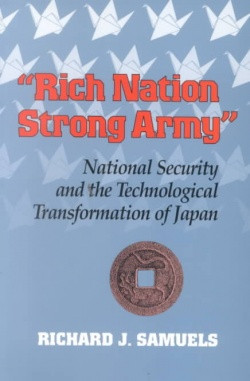Biography
Richard J. Samuels is Ford International Professor of Political Science. He was formally Director of the Center for International Studies, stepping down in July 2023 after two decades of service. He has been head of the MIT Political Science Department, Vice-Chair of the Committee on Japan of the National Research Council, and Chair of the Japan-US Friendship Commission. He has also been elected to the American Academy of Arts & Sciences and was awarded an imperial decoration, the Order of the Rising Sun, Gold and Silver Star by the Emperor of Japan and the Japanese Prime Minister. From 2014 to 2019 he was an Einstein Visiting Fellow at the Free University of Berlin, where he directed a research group on East Asian Security during the summer. His study of the political and policy consequences of the 2011 Tohoku catastrophe, 3:11: Disaster and Change in Japan, was published by Cornell University Press in 2013. Samuels’ Securing Japan: Tokyo’s Grand Strategy and the Future of East Asia, was a finalist for the Lionel Gelber Prize for the best book in international affairs. Machiavelli’s Children won the Marraro Prize from the Society for Italian Historical Studies and the Jervis-Schroeder Prize from the International History and Politics section of American Political Science Association. Earlier books were awarded prizes from the Association for Asian Studies, the Association of American University Press, and the Ohira Memorial Foundation. His articles have appeared in Foreign Affairs, International Security, Political Science Quarterly, International Organization, Journal of Modern Italian Studies, National Interest, Journal of Japanese Studies, and Daedalus. His history of the Japanese intelligence community, Special Duty, was named one of the "Best of Books 2019" by Foreign Affairs, and its translation has been an Amazon best seller in Japan since its publication by Nikkei Books in 2021. His current project, "Kidnapping Politics," examines the domestic and foreign policy implications of captivity.
Teaching
Selected Publications
Richard Samuels, “Pushing on an Open Door: Japan’s Evolutionary Security Position,” The Washington Quarterly Vol. 46, No. 2 (Summer 2023) (With Eric Heginbotham and Samuel Leiter)
Richard Samuels, “The Rise, Fall, and Reinvention of the Japanese Intelligence Community” in Ryan Shaffer ed., The Handbook of Asian intelligence Cultures (London: Roman and Littlefield, 2022)
Richard Samuels, “After Abe, Japan tries to balance ties to the US and China,” The Wall Street Journal, July 28, 2022
Richard Samuels, “Writing about Japan,” in Nora Kottmann and Cornelia Reiher, eds., Studying Japan: Handbook of Research Design, Fieldwork and Methods,” (Baden-Baden: Nomos Verlagsgessellschaft, 2020)
Richard Samuels, “La communauté de renseignement japonaise,” (The Japanese Intelligence Community) in Jean-Baptiste Jeangène Vilmer, Jean-Vincent Holeindre and Paul Chareon, eds., Le Renseignement : Approches, acteurs et enjeux (Intelligence: Approaches, Actors and Issues) (Paris: Institute for Strategic Research Ecole Militaire, 2020)
Richard Samuels, "Japan’s View of Nuclear North Korea: What Could Possibly Go Wrong?” Chapter in William Overholt, ed., North Korea: Peace? Nuclear War? (Cambridge, MA: The Mossavar-Rahmani Center for Business and Government, Harvard University, 2019) (With Eric Heginbotham)
Richard Samuels, "A New Military Strategy for Japan," Foreign Affairs, July 16, 2018 (With Eric Heginbotham)
Richard Samuels, "Japan's National Security Council: filling the whole of government?" International Affairs Vol. 94, No. 4 (July 2018) (With Mayumi Fukushima)
Richard Samuels, "Introduction: Japan's pivot in Asia," International Affairs Vol. 94, No. 4 (July 2018) (With Corey Wallace)
Richard Samuels, "Active Denial: Redesigning Japan's Response to China's Military Challenge," International Security Vol. 42, No. 4 (Spring 2018) (With Eric Heginbotham)
Richard Samuels, “Japan’s Nuclear Hedge: Beyond ‘Allergy’ and ‘Breakout’,” in Demetrios James Caraley and Robert Jervis, eds., The Proliferation of Nuclear Weapons: Extending the U.S. Umbrella and Increasing Chances of War (New York: The Academy of Political Science, 2018) (Originally published in Ashley Tellis, ed., Strategic Asia 2013-2014: Asia in the Second Nuclear Age) (With James Schoff)
Richard Samuels, "Japan's Energy Security: Strategic Discourse and Domestic Politics," in Mike M. Mochizuki and Deepa Ollapally, eds., Energy Security in Asia and Euroasia (London: Routledge, 2017) (With Mike M. Mochizuki)
Richard Samuels, "How to Get China to Use Its Leverage against North Korea," The National Interest, September 18, 2016 (With Eric Heginbotham)
Richard Samuels, "Poor Substitute: No Japanese Submarines Down Under," Foreign Affairs, May 3, 2016 (With Eric Heginbotham)
Richard Samuels, "Japan's 3.11 Master Narrative Still Under Construction," East Asian Forum, Australian National University, March 2016
Books
-
Introduction
Richard J. Samuels (With Daniel Sneider)
In Elisabeth Rubinfein, Richard J. Samuels, and Daniel Sneider, eds., Japan and the United States: The Journey of a Defeated Nation, A Diplomat’s Memoir by Yukio Okamoto (Tokyo: Tuttle Publishing, 2024)
December 2024
“Introduction”
Richard J. Samuels (With Daniel Sneider)
In Elisabeth Rubinfein, Richard J. Samuels, and Daniel Sneider, eds., Japan and the United States: The Journey of a Defeated Nation, A Diplomat’s Memoir by Yukio Okamoto (Tokyo: Tuttle Publishing, 2024)
-

Special Duty: A History of the Japanese Intelligence Community
Richard J. Samuels
The prewar history of the Japanese intelligence community demonstrates how having power over much, but insight into little can have devastating consequences. Its postwar history—one of limited Japanese power despite growing insight—has also been problematic for national security.
In Special Duty Richard J. Samuels dissects the fascinating history of the intelligence community in Japan. Looking at the impact of shifts in the strategic environment, technological change, and past failures, he probes the reasons why Japan has endured such a roller-coaster ride when it comes to intelligence gathering and analysis, and concludes that the ups and downs of the past century—combined with growing uncertainties in the regional security environment—have convinced Japanese leaders of the critical importance of striking balance between power and insight. Using examples of excessive hubris and debilitating bureaucratic competition before the Asia-Pacific War, the unavoidable dependence on US assets and popular sensitivity to security issues after World War II, and the tardy adoption of image-processing and cyber technologies, Samuels' bold book highlights the century-long history of Japan's struggles to develop a fully functioning and effective intelligence capability, and makes clear that Japanese leaders have begun to reinvent their nation's intelligence community.
-

3.11: Disaster and Change in Japan
Richard J. Samuels
On March 11, 2011, Japan was struck by the shockwaves of a 9.0 magnitude undersea earthquake originating less than 50 miles off its eastern coastline. The most powerful earthquake to have hit Japan in recorded history, it produced a devastating tsunami with waves reaching heights of over 130 feet that in turn caused an unprecedented multireactor meltdown at Fukushima Daiichi Nuclear Power Plant. This triple catastrophe claimed almost 20,000 lives, destroyed whole towns, and will ultimately cost hundreds of billions of dollars for reconstruction.
In 3.11, Richard Samuels offers the first broad scholarly assessment of the disaster’s impact on Japan’s government and society. The events of March 2011 occurred after two decades of social and economic malaise-as well as considerable political and administrative dysfunction at both the national and local levels-and resulted in national soul-searching. Political reformers saw in the tragedy cause for hope: an opportunity for Japan to remake itself. Samuels explores Japan’s post-earthquake actions in three key sectors: national security, energy policy, and local governance. For some reformers, 3.11 was a warning for Japan to overhaul its priorities and political processes. For others, it was a once-in-a-millennium event; they cautioned that while national policy could be improved, dramatic changes would be counterproductive. Still others declared that the catastrophe demonstrated the need to return to an idealized past and rebuild what has been lost to modernity and globalization.
Samuels chronicles the battles among these perspectives and analyzes various attempts to mobilize popular support by political entrepreneurs who repeatedly invoked three powerfully affective themes: leadership, community, and vulnerability. Assessing reformers’ successes and failures as they used the catastrophe to push their particular agendas-and by examining the earthquake and its aftermath alongside prior disasters in Japan, China, and the United States-Samuels outlines Japan’s rhetoric of crisis and shows how it has come to define post-3.11 politics and public policy.
-

Securing Japan: Tokyo's Grand Strategy and the Future of East Asia
Richard J. Samuels
For the past sixty years, the U.S. government has assumed that Japan's security policies would reinforce American interests in Asia. The political and military profile of Asia is changing rapidly, however. Korea's nuclear program, China's rise, and the relative decline of U.S. power have commanded strategic review in Tokyo just as these matters have in Washington. What is the next step for Japan's security policy? Will confluence with U.S. interests—and the alliance—survive intact? Will the policy be transformed? Or will Japan become more autonomous?
Richard J. Samuels demonstrates that over the last decade, a revisionist group of Japanese policymakers has consolidated power. The Koizumi government of the early 2000s took bold steps to position Japan's military to play a global security role. It left its successor, the Abe government, to further define and legitimate Japan's new grand strategy, a project well under way-and vigorously contested both at home and in the region. Securing Japan begins by tracing the history of Japan's grand strategy—from the Meiji rulers, who recognized the intimate connection between economic success and military advance, to the Konoye consensus that led to Japan's defeat in World War II and the postwar compact with the United States.
Samuels shows how the ideological connections across these wars and agreements help explain today's debate. He then explores Japan's recent strategic choices, arguing that Japan will ultimately strike a balance between national strength and national autonomy, a position that will allow it to exist securely without being either too dependent on the United States or too vulnerable to threats from China. Samuels's insights into Japanese history, society, and politics have been honed over a distinguished career and enriched by interviews with policymakers and original archival research. Securing Japan is a definitive assessment of Japanese security policy and its implications for the future of East Asia
-

Machiavelli's Children: Leaders and their Legacies in Italy and Japan
Richard J. Samuels
Two late-developing nations, Japan and Italy, similarly obsessed with achieving modernity and with joining the ranks of the great powers, have traveled parallel courses with very different national identities. In this audacious book about leadership and historical choices, Richard J. Samuels emphasizes the role of human ingenuity in political change. He draws on interviews and archival research in a fascinating series of paired biographies of political and business leaders from Italy and Japan.
Beginning with the founding of modern nation-states after the Meiji Restoration and the Risorgimento, Samuels traces the developmental dynamic in both countries through the failure of early liberalism, the coming of fascism, imperial adventures, defeat in wartime, and reconstruction as American allies. Highlights of Machiavelli's Children include new accounts of the making of postwar Japanese politics—using American money and Manchukuo connections—and of the collapse of Italian political parties in the Clean Hands (Mani Pulite) scandal.
The author also tells the more recent stories of Umberto Bossi's regional experiment, the Lega Nord, the different choices made by Italian and Japanese communist party leaders after the collapse of the USSR, and the leadership of Silvio Berlusconi and Ishihara Shintar on the contemporary right in each country.
-
Crisis and Innovation in Asian Technology
The economic crises in Asia at the turn of the millennium changed the innovation and business production systems of China, Malaysia, Japan, Singapore, South Korea, Thailand, and Taiwan. This investigation follows several different industries, including semiconductors, automobiles, and hard disk drives. It explores the approaches that Asian nations have taken to building a strong technological and economic base for their respective industries from technonationalism to technoglobalism. It asks if the Asian economic miracle is over, or whether these countries are reinventing their economies.
-

"Rich Nation, Strong Army": National Security and the Technological Transformation of Japan
Richard J. Samuels
Since World War II, Japan has become not only a model producer of high-tech consumer goods, but also - despite minimal spending on defense - a leader in innovative technology with both military and civilian uses. In the United States, nearly one in every three scientists and engineers was engaged in defense-related research and development at the end of the Cold War, but the relative strength of the American economy has declined in recent years. What is the relationship between what has happened in the two countries? And where did Japan's technological excellence come from? In an economic history that will arouse controversy on both sides of the Pacific, Richard J. Samuels finds a key to Japan's success in an ideology of technological development that advances national interests. From 1868 until 1945, the Japanese economy was fired by the development of technology to enhance national security; the rallying cry "Rich Nation, Strong Army" accompanied the expanded military spending and aggressive foreign policy that led to the disasters of the War in the Pacific. Postwar economic planners reversed the assumptions that had driven Japan's industrialization, Samuels shows, promoting instead the development of commercial technology and infrastructure. By valuing process improvements as much as product innovation, the modern Japanese system has built up the national capacity to innovate while ensuring that technological advances have been diffused broadly through industries such as aerospace that have both civilian and military applications. Struggling with the uncertainties of a post-Cold War economy, the United States has important lessons to learn from the way Japan has subordinated defenseproduction yet emerged as one of the most technologically sophisticated nations in the world.
-
The Political Culture of Foreign Area and International Studies: Essays in Honor of Lucian W. Pye
Ten essays from a June 1991 conference in Dedham, Massachusetts explore the political cultures that shape both the agenda and the content of scholarship on foreign areas, and how such political cultures have been the subject of both study and public policy.
-
Getting America Ready for Japanese Science and Technology
Richard J. Samuels and Ronald A. Morse (eds.)
The result of a conference jointly sponsored by the Asia Program of the Wilson Center and the MIT-Japan Science and Technology Program, these papers suggest that America must better understand its major high-tech competitor, Japan, if it wishes to balance our bilateral relationship. The challenge of overcoming America's technical illiteracy about Japanese science and technology requires awareness of the importance of training scientists and engineers in the Japanese language, increased funding for applied Japanese language studies, and a commitment by U.S. corporations to employ Americans that acquire foreign language and area expertise. Co-published with the Woodrow Wilson International Center for Scholars.
-
The Politics of Regional Policy in Japan: Localities Incorporated?
Richard J. Samuels
This is the first major study of politics and public administration in Japan to balance the prevailing view of the regional policy process from above” with a view “from below.” Developing a comparative framework for understanding the place of localities in policy making, he demonstrates that relations among localities in Japan are much more important than previously supposed.
-
Political Generations and Political Development
Richard J. Samuels (ed.)
Lexington, MA: Lexington Books, 1977
Media
TV/Radio:
NPR, Here and Now, May 13, 2016, "Obama's Visit to Hiroshima Is About Memory More Than It's About Apology."
NHK, September 11 and 12, 2015. Topic: "Power Plays in Asia-Pacific 70 years after WWII"
Talks:
Moderator, MIT Starr Forum, "3.11 Ten Years Later: Disaster and Resilience in Japan." March 11, 2021.
UC San Diego: "A Conversation about Japanese Politics and Public Policy with Richard Samuels," March 9, 2011.
Moderator, MIT Starr Forum, "President Biden's Foreign Policy Challenges: Views from Abroad," January27, 2021.
Moderator, MIT Starr Forum, "Democracy in distress?" October 23, 2020.
Podcasts:
The Japanese Intelligence Community & Espionage, March 15, 2020. Japan Station: A Podcast, by Japankyo.com
Asia Today with Jeffrey Bingham Mead, on December 7, 2019, discussing Samuels' new book Special Duty. Podcast #49
Press:
Quoted in “Shinzo Abe’s Influence Was Still Evident Long After He Left Office” New York Times, July 8, 2022.
Quoted in “Why Shinzo Abe was such a towering figure in Japan” The Hill, July 8, 2022.
Quoted in "The Fukushima disaster was not the turning point many had hoped," The Economist, March 6, 2021.
His work is discussed in "National security is in the eye of the beholder,"The Japan Times, May 11, 2020.
Quoted in "North Korea's Threat Pushes Japan to Reassess Its Might and Rights," New York Times, September 15, 2017.
Recent News
-
US–Japan Foundation establishes Richard J. Samuels Dissertation Award
United States-Japan Foundation
October 30, 2025
-
Japan’s intelligence capabilities with Professor Richard J Samuels, Professor Kotani Ken and Hosaka Sanshiro
Robert Ward | IISS
July 11, 2024
-
Shinzo Abe’s influence was still evident long after he left office
David E. Sanger | The New York Times
July 8, 2022
-
3 Questions: Richard Samuels on Japan’s 3.11 triple disaster and its impact 10 years laterMIT
MIT Center for International Studies
March 11, 2021








